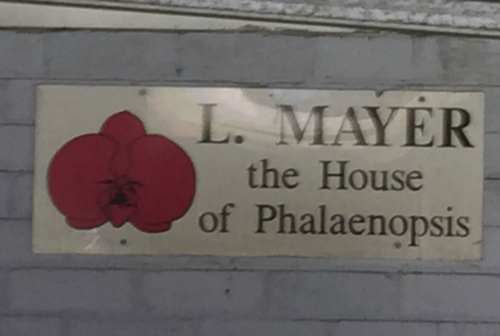Lou Mayer passed away recently at the age of 89. He is survived by his wife Judith (between them they had 5 children, 15 grandchildren and 7 great-grandchildren).
Lou migrated to Australia from Germany with limited English. That did not stop him from becoming the National Credit Manage for ICI Dulux (as it was then known).
However he was famous in Lane Cove for his Orchids.
In 2015, ITC wrote the following about Lou.
On the Corner of Wood Street and Lloyd Rees Drive is a little Lane Cove Gem. It is Lou Mayer’s House of Phalaenopsis.
 For years ITC has driven past this house and wondered what was inside the L Mayer the House of Phalaenopsis
For years ITC has driven past this house and wondered what was inside the L Mayer the House of Phalaenopsis

What is Phalaenopsis? According to the NSW Orchid Society:
Phalaenopsis, the Moth Orchids mainly native to tropical East-Asia, are one of the best orchids for growing in the home, as well as a favourite with glasshouse growers, due to their long lasting showy flowers.
In a recent survey the Flower Association of Queensland, discovered that Queensland’s favourite flowers are rose, orchid, lily, gerbera, and carnation, in that order. This survey is backed up by information released by the Australian Flower Industry Association.
Last week, ITC knocked on the door of the L Mayer House of Phalaenopsis and found inside two ITC Facebook Fans who love growing Orchids. Lou and Judith Mayer have been married for 50 years and have lived in Lane Cove for 45 years. Lou is a talented and award-winning Orchid grower who has the most wonderful backyard filled with visual delights. Lou was kind enough to take ITC on an impromptu tour of their backyard.

Here are just a few of the beautiful orchids I saw on my visit.

Lou not only grows orchids, he also grows fruit and vegetables in his backyard and has hired a bee hive to help with pollination. Did you know there is a bee crisis? According to Greenpeace:
Since the late 1990s, beekeepers around the world have observed the mysterious and sudden disappearance of bees, and report unusually high rates of decline in honeybee colonies.
Bees make more than honey – they are key to food production because they pollinate crops. Bumblebees, other wild bees, and insects like butterflies, wasps, and flies all provide valuable pollination services. A third of the food that we eat depends on pollinating insects: vegetables like zucchini, fruits like apricot, nuts like almonds, spices like coriander, edible oils like canola, and many more… In Europe alone, the growth of over 4,000 vegetables depends on the essential work of pollinators. But currently, more and more bees are dying. The bee decline affects mankind too. Our lives depend on theirs.
We even found a little object that also appears in the Lane Cove Plaza. Apparently, it does a good job in the garden for Lou!!
Thank you to Lou and Judith for letting ITC have a squizz around their garden.
Vale Lou – you and your skills will be missed. Thinking of Judith and the family.














